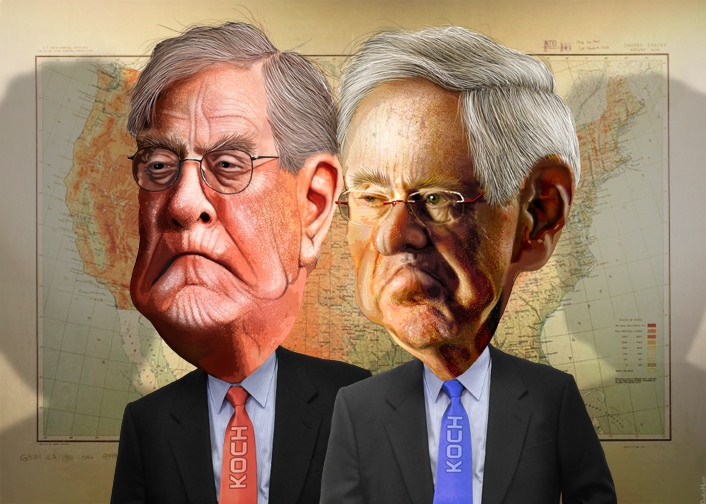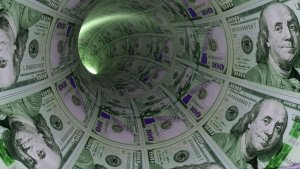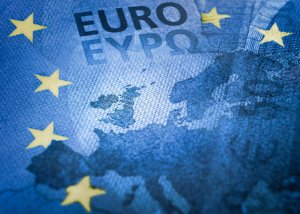At the beginning of May 2018, there was a brief furor over donations from Koch family-affiliated philanthropies to fund the Mercatus Institute and the newly-named Antonin Scalia School of Law at George Mason University (GMU). Although articles concerning the admirable efforts of the GMU student organization UnKoch My Campus appeared in many of the prominent news outlets, the attention span of journalists seemed to barely outpace that of interest in one of Donald Trump’s tweets, with even less consequence. But more to the point, the silence of the economics profession concerning the revelations was pretty deafening. Briefly, I would like to revisit why this was so and why it matters.
The details of the controversy can be briefly summarized: the assortment of Koch family foundations and allied charitable cutouts (which some libertarians have dubbed the “Kochtopus,” but will henceforth here be shortened to ‘the Kochs’) have been making targeted donations to more than 300 schools since 2005, predominantly to economics departments. But George Mason University has been the most lavishly favored, garnering more than a third of the estimated $150 million bequeathed to universities from 2005-2015. The event that stirred campus resistance at GMU was a massive donation of $10 million from the Kochs tied to a $20 million donation from an anonymous benefactor to rename the Law School after Antonin Scalia, “formally” earmarked for “student scholarships.” The first thing one notices was the budgetary legerdemain which obscured the relationship between faculty selection and line items in budgetary terms. Thus, the GMU Provost S. David Wu could tell his Faculty Senate in April 2016 that the bequest came with “no strings attached…The entire $30M is for scholarships for students and nothing else.” This narrative might have prevailed, if not for the document dump by UnKoch My Campus at the end of April,[1] a result of a FOIA suit by Transparency GMU, which detailed the series of negotiations with the Kochs (including the overwhelming role of figures from the Federalist Society as intermediaries: another Koch funded arm), including stipulations of how designated representatives would have input into GMU hiring decisions. This forced GMU President Angel Cabrera to reverse earlier statements that existing donor arrangements had not been allowed to influence internal academic matters. This, in turn, was the trigger which attracted the national press. As Inside Higher Ed put it: “academic values have long held that donors don’t get to pick who holds chairs, or evaluate them.”
“It’s now abundantly clear that the administration of Mason, in partnership with the Mercatus Center and private donors, violated principles of academic freedom, academic control and ceded faculty governance to private donors,” said Bethany Letiecq, President of GMU’s chapter of the AAUP. But this reaction might underestimate the scope of the problem, reducing it to a mere matter of moral integrity. I shall argue instead that this event has more structural underpinnings, touching upon the very conception of education in relation to markets, and involve some crucial aspects of economic theory.
Broadly speaking, economists greeted this controversy with a big yawn: this sort of thing happens all the time, so don’t get your panties in a twist. Indeed, the Kochs have been making similar grants to many universities for more than a decade, as have other philanthropies. The attitude was that the GMU case was nothing special.
How do economists justify the unflappable lightness of their nonchalance?
First off, many opine that the donors don’t really interfere in academic matters; it is just the optics that are less than optimal. There are some crucial details which mitigate this pronouncement when it comes to the GMU case, which are dealt with in a footnote.[2] Nevertheless, in general, most economists are quick to denounce the idea that there are subtle procedural moves attached to donations that substantially alter the practices of universities, as well as the composition of what is taught and researched.
Secondly, for most economists, there are no such things as conflicts of interest, at least when it comes to economic thinking. They regularly declare with ardor that no one is compromising their pronouncements or perverting their beliefs for money. Years ago, I documented this attitude with regard to the culpability of economists for the Great Crash of 2007-8, even in the face of embarrassments such as the scathing portrayal of certain figures in the documentary Inside Job, or the prospect of a code of ethics for economists by the American Economics Association (AEA), a point to which I will return.[3] In the GMU case, the prescription for disclosure was rejected—hence the need for FOIA requests. The economists generally argued that the people involved had long ago settled upon their personal political beliefs; they were just being selected by the donors to provide a coherent curriculum in “free market doctrine.” I shall argue below that this imprecision over the criteria of which doctrines have been selected allow this sense that the ecology of knowledge persists unaltered in the face of concerted Koch intervention.
Third, the orthodox economist would be inclined point out that all potential donors, just like all fledgling academics, possess their own prior interests and convictions, which will be subject to further selection one way or another. It is not the money that makes the difference in the larger scheme of things. As the late Craufurd Goodwin of Duke University used to say, “The only tainted money is the money that t’aint [sic] mine.” In other words, the sociology of knowledge pretty much works independently of the wishes of any funders involved, since everyone is selfishly scrambling for support. Money as such never taints the well of human inquiry, or so most economists postulate. Of course, one’s appreciation for this putative conservation rule might be qualified when one learns that Goodwin had himself been a Program Officer for European and International Affairs under McGeorge Bundy at the Ford Foundation during the Cold War.[4]
Finally, although they might not say this out loud in front of journalists, many economists tend to suspect that all the complaints about the Kochs are just sour grapes, an ideological reaction deriving from the wailers’ disdain for the politics of the Koch brothers and their minions. After all, what’s so suspicious about wanting to “rectify the bias” of academics hostile to free markets and freedom of speech? That sounds like something most economists would voluntarily support in any event, independent of whomever was fronting the funding. But, just as in the previous cases, this ignores the actual content of the doctrines that the Koch brothers, as well as that of many of their fellow travelers and cooperating philanthropists,[5] seek to promote through their initiatives.
It will come as no surprise to realize that public education is being brutally weaned from state support across the developed world in the recent past, and that private funding has been touted as the deliverance for cash-strapped universities. In this regard, it is pivotal to realize the significance of the fact that George Mason University is a public and not a private university. Far from being a mere shifting of sources of sustenance, this trend itself constitutes one of the prime prescriptions of the political doctrine that motivates the Kochs, namely, neoliberalism.[6] Neoliberalism shouldn’t be confused with actual libertarianism; it is predicated upon intervention to bring about the types of government and markets that the neoliberals believe are necessary for the success of capitalism: it just won’t happen by itself. One of their central doctrines relevant to the current controversy is their belief that an efficient market is one that processes and validates information, and conveys it to the appropriate agents when and where they need it. Human knowledge is thus first and foremost a market phenomenon.
A direct consequence of this doctrine is that the state should not control public education: the purpose of education is the personal accumulation of human capital, and not the creation of the common denominator of an educated citizenry. Hence many of the major figures of the Neoliberal Thought Collective—Milton Friedman, James Buchanan, Charles Koch—long ago proposed that education be “privatized” in most of its various manifestations. Knowledge is paltry if not put up for sale, as they see it. This is the major consideration which dictates that the points at issue at GMU and elsewhere are not merely some symmetrical offsetting response to left wing donations to universities; rather, the whole point of the Koch brothers’ intervention is to produce a different kind of university, one which renders government-run education much more responsive to market signals and market dictates. It is a world where people of means can freely buy the kinds of doctrines that they wish to be conveyed to the young, without being coy or ambagious about it. Hence the Koch’s doctrines and their philanthropic behaviors are tightly bound into a single package, displaying a coherence not found in the motives of lesser philanthropists. This explains why the Kochs are willing to conduct their negotiations with universities in secret, to carry out their stipulations through cutouts and hard to trace intermediaries and foundations, to package their offers with other rich (and anonymous) donors en banc and to impose conditions upon their bequests that effectively neutralize all previous principles of academic freedom in the long run.
There is a different implication of neoliberal conceptions of knowledge, and that extends to the ideas which constitute the microeconomic orthodoxy. Once information was introduced into the standard pricing model, it was discovered there was no single correct way to formalize epistemology. Through a sequence of different models, the profession moved from the agent as capable of super-cognition, to the portrait of the agent as a flawed vessel for knowledge, offset by a neoliberal notion of the market as super-information processor.[7] Truth became a function of the skewed and arbitrary ability to pay; and consequently, economists were deemed to have possessed superior wisdom concerning whom should get to know what under which circumstances. As self-appointed Engineers of the Human Soul, this reinforced their conviction that there was no need to worry about conflicts of interest, nor indeed, about the increasing prevalence of unashamed mendacity and fake news.[8] Thus, the Koch interventions were therefore regarded as essentially harmless.
Of course, economists would be most interested in the ways this promotes the careers of other economists, but the ambitions of the neoliberal thought collective extends well beyond the social sciences, even unto the realm of the natural sciences. Neoliberalism is supremely hostile to expertise, which is the flip side of its hostility to old-school universities. Hayek denounced intellectuals as ‘second-hand dealers in ideas’, and modern neoliberals extrapolate that inclination to the limit. In their view, even natural scientists need to learn to subordinate their own research to “the market,” and accept that tomorrow the market might devalue their own expertise in favor of the beliefs of less trained participants. “Freedom” is in this instance made manifest as the ability to insert your own 2 cents at will; let the market sort it out. This insight prompts another reconstruction of university life, this time in the direction of so-called ‘open science’ and ‘citizen science’.[9] The literal construction of a ‘marketplace of ideas’ leads directly to the elevation of the market as the ultimate validator of truth in most dimensions, and the subordination of professional researchers to a less central role, surrounded by platforms that harvest the unremunerated labor of the reserve army of the undereducated. This is creative destruction with a vengeance, which further diminishes the role of the university.
Consequently, while economists tend to think they come equipped to understand all the implications of a thoroughgoing marketplace of ideas, the four conventional ideas sketched above reveal that they currently are far from having a comprehensive appreciation of the “economics of information” as it plays out in the world.
An example of this inadequate approach is a very brief code of professional conduct ratified in April 2018 by the AEA. Its actual wording is significant. It states, “Integrity demands honesty, care and transparency in conducting and presenting research; disinterested assessment of ideas; acknowledgement of the limits of expertise; and disclosure of real and perceived conflicts of interest.” [10] There was nothing in the statement proposing that the AEA or any other institution should promote or enforce disclosure, nor indeed define what should be disclosed; it says absolutely nothing at all about “academic freedom.” “Integrity” is apparently conceived as personal virtue, although a subsequent paragraph promotes “a professional environment with equal opportunity and fair treatment for all economists.” This species of “environment” seems be more concerned with employment of economists than the preservation of academic inquiry as such.
This is why the GMU incident deserves far more scrutiny than it has received from economists, and academics in general.
[1] http://www.unkochmycampus.org/charles-koch-foundation-george-mason-mercatus-donor-influence-exposed
[2] Some sources report the document dump reveals that ‘the Kochs’ reserved the right of designation of members on faculty selection committees and veto rights in earlier gifts to Mercatus, but in the Scalia School case, the agreement stated that they would have no power over retention or promotion. On this, see https://www.nationalreview.com/2018/05/washington-post-koch-brothers-scoop-falls-apart/ . However, the situation at GMU was far more complex than that, because the emails independently stipulated whom among existing Koch-financed GMU faculty and the Federalist society would make such decisions for the Law School; and furthermore, the Kochs reserved the right to withdraw from the agreement without notice or just cause. Clearly, this Sword of Damocles allowed them to veto any subsequent choices, all the while asserting formally in the document that they unreservedly supported academic freedom. The Kochs, after decades of experience, have gotten good at circumventing faculty who don’t understand how the takeover of universities actually works.
[3] See Philip Mirowski, Never Let a Serious Crisis Go to Waste (Verso, 2013), pp. 218-223.
[4] See, for instance, James Petras, “The Ford Foundation and the CIA,” at: https://www.ratical.org/ratville/CAH/FordFandCIA.html .
[5] See, for instance, the fascinating case of BB&T: Douglas Beets, “BB&T, Atlas Shrugged, and the ethics of corporation influence on college curricula,” Journal of Academic Ethics, 2015, (13):311-344.
[6] This is not the place to explicate fine points of political doctrine. However, see Mirowski, Never Let.. (op. cit.) as well as: https://www.ineteconomics.org/research/research-papers/the-political-movement-that-dared-not-speak-its-own-name-the-neoliberal-thought-collective-under-erasure .
[7] This is described in detail in: Philip Mirowski and Edward Nik-Khah, The Knowledge we Have Lost in Information, (Oxford, 2017).
[8] See, for instance, Matthew Gentzkow & Jesse Shapiro, “Competition and Truth in the Market for News,” Journal of Economic Perspectives, (2008) 22:133-154. On his later work, “A reader of our study could very reasonably say, based on our set of facts, that it is unlikely that fake news swayed the election,” said Gentzkow. At: https://news.stanford.edu/2017/01/18/stanford-study-examines-fake-news-2016-presidential-election .
[9] For a greater elaboration of this argument, see Philip Mirowski, “The Future(s) of Open Science,” Social Studies of Science, 2018 at: http://journals.sagepub.com/doi/abs/10.1177/0306312718772086




